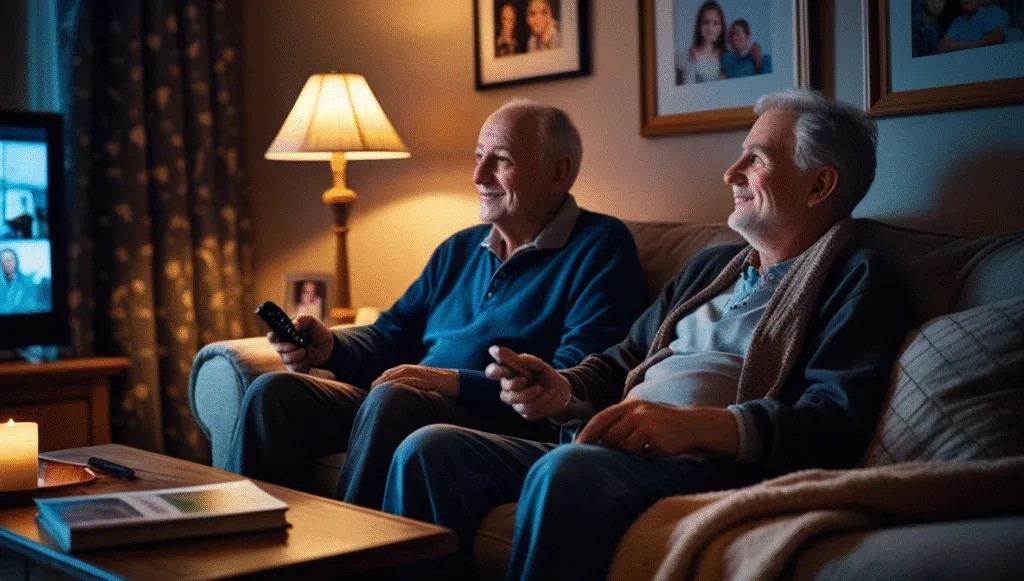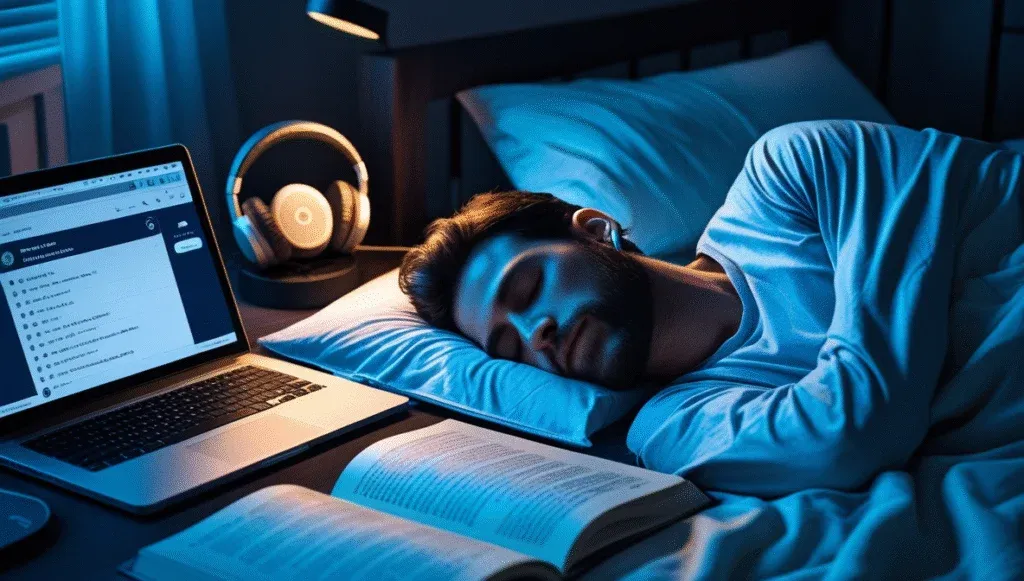Living with multiple sclerosis changes the shape of a day. For me, the evenings used to be the chaotic part — a slow slide into fatigue, stiffness, and brain fog that felt utterly unpredictable. Over time, though, I realised something quietly powerful: evening rituals are not just routines; they’re a form of stability when MS feels anything but stable. They soften the transition from day into night, they protect precious energy, and they remind me that I still have influence over how my day ends.
What I’ve built now is less about perfection and more about kindness. My evening rituals guide my body toward rest and give my mind permission to let go. They’re simple, but they are the difference between waking up shattered and waking up with enough strength to face the next day.
Why Evening Rituals Matter More with MS
By late afternoon, my symptoms tend to rise like a tide — creeping fatigue, heavier legs, prickling skin, wobbly balance, and the kind of cognitive fog that makes even basic decisions feel like astrophysics. This is why structured evening rituals are vital. They buffer me from that nightly crescendo of symptoms and help regulate my nervous system long before my head hits the pillow.
Vacant Space 2
A holding space for, possible, future development.
For people with MS, evenings can be the hardest part of the day. Sensory overload, overstimulation, and a tired brain all collide. A predictable rhythm helps reduce that chaos. It’s not about squeezing more into the day — it’s about gently closing it down.
And there’s a deeper truth I’ve discovered over the years:
sleep is the best healer I have.
No supplement, no treatment, no coping strategy comes close to the restorative effect of a well-managed night. Which is why calm, consistent evening rituals are now one of the greatest gifts I give myself.
MY EVENING RITUALS: A STEP-BY-STEP LOOK
My evening rituals have evolved over the years — not from ambition, but from necessity. MS has a way of teaching you what works, usually by punishing what doesn’t. What I have now is a gentle, dependable sequence that helps me conserve energy, reduce overstimulation, and ease my mind into rest. They may look like simple evening rituals, but their impact is profound.
Below is how my evenings unfold, one quiet step at a time.

1. Winding Down Begins with the Clock
The first part of my evening rituals starts with something deceptively ordinary: noticing the time. Around 8:30 p.m., my body begins sending unmistakable signals — the heaviness behind the eyes, the creeping stiffness, and that subtle rise in cognitive haze. If I push through it, I always pay for it. So the clock becomes my ally.
I dim lights, reduce noise, and let the house slow down with me. These are the evening ritual habits that keep overstimulation at bay. Eating early also matters. Late meals disrupt my digestion and, inevitably, my sleep — something MS taught me the hard way.
A calmer evening sets up a calmer tomorrow, and that will make you happy when you realise how much better mornings can feel.
2. A Warm Drink and a Moment of Reflection
No caffeine. No sugar jolts. Just something warm and gentle — herbal tea or a malted drink. This tiny pause in my evening rituals acts like a bridge between the busyness of the day and the quiet that follows.
While I sip, I reflect on the day — not in a diary sense, but in a practical, compassionate way. What went well? What needs carrying into tomorrow? What can I let go of? These rituals for evening calm help me mentally settle before sleep even begins.
It’s a small ritual, but one of the most grounding.
By the time evening arrives, the mental fog deepens and the familiar pins & needles begin their quiet mischief, reminding me why a calm routine matters so much.
3. Quiet Entertainment: TV or a Good Book
This stage of my evening rituals used to revolve around my Kindle, but I’ve learned that screens can stir the brain at the very moment I need it to slow down. These days, I often choose a paperback book or put something low-key on the TV with my wife — nothing intense, nothing noisy.
Sometimes I play language lessons aloud in Spanish or Portuguese, not to study, but to let the sounds float around my head as sleep approaches. The results have been… mixed, to put it kindly. But as part of my calming evening rituals, it gives me something peaceful to drift into.
On difficult days, paraesthesia in my limbs pairs with cognitive-dysfunction in my thoughts, creating a kind of double-fog that makes simple tasks feel strangely complicated.
4. Evening Medications and MS Management
No matter how relaxed I feel, my evening rituals must include my medication routine — without exception. I once prided myself on avoiding pills, but MS doesn’t let idealism survive for long. Now, with tamsulosin, mirabegron, and low-dose amitriptyline, my nightly medication check is one of those life-preserving simple evening rituals.
I open my pill organiser, double-check the day, set up the next dose, and pause to notice how my body behaved. Did I experience new tingling? An odd spike of fatigue? Muscle spasms that weren’t there yesterday? This is my quiet clinical moment — a chance to pay attention, not panic.
Medication isn’t surrender. It’s strategy.
On the nights when sleep doesn’t come easily, I lean more heavily on the gentlest parts of my routine to remind my nervous system that it’s safe to slow down.
5. Bathroom Prep and the Pee-Bottle Routine
It’s not glamorous. It’s not Instagram-worthy. But it’s essential. As part of my evening rituals, I brush my teeth, clear the bedroom floor, and check the pee-bottle beside the bed — a small tool that prevents a big risk.
I resisted it for years, clinging to a sense of normality… until the night I blacked out in the bathroom and hit the floor like a sack of spuds. Pride has no place in nighttime safety. Now the pee-bottle is non-negotiable, and it protects me from dangerous 3 a.m. bathroom treks.
It may look like one of the strangest evening ritual habits, but it’s also one of the most sensible.

The Emotional Comfort of Evening Rituals
For years, I thought routines were the enemy. I believed I thrived on spontaneity, challenge, and the thrill of pushing myself. MS rewired that belief completely. Now, my evening rituals feel like a soft blanket of predictability wrapping itself around the end of my day. They’re practical, yes — but they’re also deeply emotional.
Each step says:
You made it through today. Let’s make tomorrow a bit easier.
There is dignity in these quiet acts. They help me reclaim a sense of agency at the very moment MS symptoms often rise to their loudest. And oddly, they settle something inside me. My evening rituals have become gestures of self-respect — small acts of kindness toward future me.
They don’t fix everything. They don’t silence MS. But they make the evenings gentler, safer, and more humane.
Between fatigue management, invisible symptoms that few ever notice, and the sleep problems that come and go without warning, living with MS often feels like juggling challenges no one else can see.
Evening Rituals and Brain Fog
When fatigue meets cognitive dysfunction, evenings can become a maze. Decisions become harder, memory becomes patchy, and too much sensory input can tip me into overwhelm. This is where structured evening rituals truly shine. They reduce decision fatigue by turning the last part of the day into a familiar pattern.
Timers, checklists, and visual cues guide me through what my brain might otherwise forget. I’m not automating my life — I’m supporting it. These patterns also tie directly into rituals for evening calm, giving my nervous system a predictable wind-down.
When I follow the sequence, I sleep better. When I abandon it, I feel it the next morning — in my body, my mood, and my fogged thinking.
When My Evening Rituals Go Awry
Not every night goes as planned. MS doesn’t operate on a tidy schedule. Some evenings bring flare-ups, random waves of pain, or the kind of exhaustion that knocks the whole structure sideways. On those nights, my calming evening rituals fall apart.
Maybe I skip my drink. Maybe I mistime medication. Maybe the TV stays on far too late. The result is painfully predictable: poor sleep, more stiffness, muddled thinking, and a day that begins on the back foot.
These hiccups aren’t failures. They’re reminders of why my evening rituals matter so much. They’re not luxuries — they’re part of my survival toolkit.
I’ve learned that managing stress isn’t about eliminating pressure altogether, but about creating small, steady habits that stop it from overwhelming me.

SLEEP: THE BEST HEALER WE HAVE
Sleep has become one of my most valued resources. Not long ago, I underestimated it — treating it as something passive, automatic, a background process. But MS taught me otherwise. Sleep isn’t passive at all. It’s active repair. It’s neurological housekeeping. It’s the closest thing I have to a nightly reset button.
And the truth I’ve learned, sometimes the hard way, is simple:
sleep is the best healer I own.
Everything else in my routine exists to support that one goal.
My evening rituals create the runway for rest, but sleep itself is the place where my body does its deepest healing. Here’s what I’ve found helps most — especially when sleep doesn’t come easily.
Creating a Calming Sleep Environment
MS can make sleep a tricky business — spasms, nerve pain, bladder urgency, and overheating are all common nocturnal hurdles. That’s why environment matters so much.
A few principles guide my nighttime setup:
- Low light, warm colours. Bright white light jolts my senses. Soft amber lighting signals my brain that night has arrived.
- Cool bedroom. MS heat sensitivity makes warm rooms unbearable, so I keep things slightly cool — comfortable but never stifling.
- Minimal noise. A quiet house helps; a quiet mind follows.
- A decluttered floor. Trip hazards at 3 a.m. are an accident waiting to happen.
I also keep my pee-bottle within reach — not glamorous, but very effective. It’s a small detail from my evening rituals that prevents dangerous midnight bathroom expeditions.
For additional strategies, I sometimes revisit trusted resources like the MS Trust’s tips for improving your nights (external link #2) and the MS Society’s relaxation and complementary therapy advice. These reinforce what I’ve learned through lived experience.
Techniques for When Sleep Won’t Come Easily
Even with the best preparation, falling asleep can still feel like a negotiation with my own nervous system. When my mind won’t settle, I return to gentle methods — never forced, always optional:
- Breathing exercises — inhaling for four seconds, exhaling for six.
- Progressive muscle relaxation, working from toes to forehead.
- Guided audio, especially soft stories or calming voices.
- Light stretching before bed if spasms are threatening.
- Mindfulness techniques, often drawing on guidance similar to what I’ve read at Moodswings and Milestones
These methods don’t cure insomnia, but they soften its edges and bring my system back toward rest.
Living with MS has taught me that time perception shifts subtly throughout the day, and that MS symptoms in men and women can influence those changes in surprisingly different ways.

The Role of Consistency
It might sound dull — even rigid — but consistency is my secret weapon. Going to bed at roughly the same time, waking at roughly the same time, and keeping my evening routine predictable trains my brain to recognise when to switch modes.
This fits perfectly with what so many MS communities share in their lived experiences, including personal stories from the National MS Society (external link #6) and Healthline’s MS story collections. There’s a universal truth across these accounts: consistency reduces chaos.
And for me, it reduces night-time anxiety. When my body knows what comes next, it relaxes. When my mind trusts the pattern, sleep follows more naturally.
Why Sleep Shapes the Next Morning
If I sleep well, the morning feels manageable. If I don’t, MS is merciless. This isn’t just a preference — it’s a neurological reality. Poor sleep amplifies my pain, worsens cognitive fog, and steals the resilience I need to move through the day.
This is why I protect sleep with the same seriousness I give to medication or symptom management. A strong evening routine isn’t just about tonight. It’s about giving tomorrow — and the next day after that — the best chance possible.
Some evenings, muscle weakness combines with tingling in the extremities, creating a strange mix of heaviness and static that signals my body is ready to slow down.
FINAL REFLECTIONS
By the time I reach the final steps of my evening rituals, something shifts. My body feels heavier but calmer. My mind loosens its grip on the day. And somewhere between turning off the lamp and settling under the duvet, I’m reminded that these routines aren’t chores — they’re acts of care. They honour the reality of MS without letting it dictate every part of my life.
Even on the nights when things go wrong, the intention behind my evening rituals remains the same: create a sense of safety, prepare for rest, and give tomorrow a better chance than today had.
And really, that’s all I’m trying to do — take the small wins where I can, protect the energy I have left, and build a rhythm that helps me live with MS rather than fight it endlessly.
Frequently Asked Questions
What is an evening ritual?
An evening ritual is a repeatable, calming routine you follow at the end of the day to prepare your mind and body for rest. For people with MS, it can help reduce overstimulation, manage symptoms, and support healthier sleep patterns.
What is a nightly ritual?
A nightly ritual is essentially the same as an evening ritual — a sequence of habits that signal to your body that the day is ending. It might include winding down activities, light stretches, mindfulness, medication, or any steps that bring a sense of closure.
What is the evening ritual in The Giver?
In The Giver, the evening ritual involves each family member sharing their feelings from the day. It’s a moment of connection, reflection, and emotional honesty. While fictional, it echoes the importance of consistent routines in helping people unwind.
What is a night ritual?
A night ritual refers to the calming habits a person follows right before sleep. It may include turning off screens, dimming lights, reading, gentle breathing exercises, or anything that helps the body shift into rest mode.
Conclusion: Routine as Quiet Resistance
Living with MS means adapting constantly, often in ways no one else sees. My structured evening rituals have become one of my strongest tools — not because they’re dramatic, but because they’re dependable. They anchor me. They soften the edges of long days. And they help me wake with more clarity, less pain, and a little more courage.
In a way, these routines are a quiet form of resistance — a refusal to let MS set every rule. Through evening ritual habits, calming evening rituals, simple evening rituals, and the small acts that shape my nights, I continue building a life with purpose and steadiness. These patterns, supported by rituals for evening calm, don’t cure MS — but they certainly help me live more peacefully with it.
And every night, as I follow the same familiar steps, I’m reminded that hope often hides in the ordinary.
I often revisit the work of Dr Terry Wahls when I need a reminder that small, consistent lifestyle choices can still shape my wellbeing in meaningful ways.
“Save the trees, they allow us to breathe.”
– Stephenism
🎵 Soul from the Solo Blogger — Tunes from Túrail.




